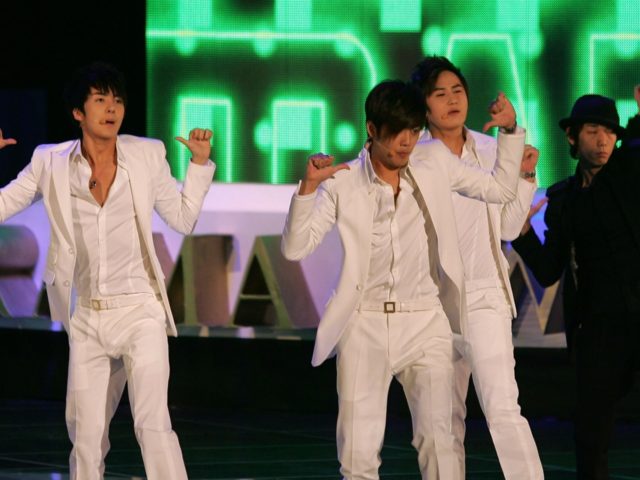Kim Kyu-jong, a member of the Korean boy band SS501, apologized profusely after revealing he is dating a Japanese woman, outraging South Koreans currently engaging in a boycott campaign against Japan for placing export controls on materials necessary for high-tech manufacturing, the Korea Times reported on Monday.
The Korea Times noted that several South Korean celebrities have publicly joined the “boycott Japan” campaign, which has targeted popular Japanese products like cars and beer.
The Japanese government suggested this month that Seoul was allowing chemicals and sensitive materials it imports from Japan to enter North Korea, violating international sanctions. It restricted South Korean companies’ ability to import them. South Korean politicians, in turn, accused Japan of violating North Korea sanctions.
Leftist South Korean President Moon Jae-in also claimed that Japanese Prime Minister Abe Shinzo had a “political” motive for imposing trade restrictions, suggesting they were payback for Moon’s campaign to get Japan to pay more reparations for Korea’s “comfort women” – girls and women Imperial Japan forced into sex slavery during World War II.
South Korea now fears Japan will remove the country from its “white list” of countries that do not need permission for every individual trade exchange suggested with Japan.
Caught up in this diplomatic firestorm is Kim Kyu-jong, who posted photographs on Instagram last week that showed him in Japan with his girlfriend, who had not been confirmed to be his partner before the images surfaced. The images triggered both intrigue given the unknown identity of the woman in the photos, and outrage, as the “boycott Japan” campaign has also encouraged Koreans not to travel to the island nation. Kim rapidly deleted the photos.
On Friday, Kim posted a statement on Instagram apologizing for the images.
“I’m sorry I shocked and upset you. I am currently preparing for a movie, musical, and play. I wanted to greet you with good news, but … I am sorry for posting this message so late because I was thinking about what to say. I sincerely apologize for hurting you so much,” Kim wrote.
Kim promised to be more “prudent and mature” with his personal life.
The K-pop news outlet Soompi reported that Kim confirmed that the woman in the photo was both Japanese and his girlfriend to a South Korean newspaper on Sunday. He insisted that “the trip to Japan wasn’t recent,” implying it occurred before the boycott campaign began, and said he was “afraid and cautious to talk about” his relationship in the current political climate.
The young stars of Korean pop music, or K-pop, often face tremendous public scrutiny, becoming famous typically after years of rigorous dance and music training in record label “boot camps.” From public failed relationships to insufficiently outstanding forced military service, K-pop stars apologize to their devout fans profusely and often. Several incidents of mental health trauma in the pop star community have triggered alarm – notably the suicide of 27-year-old SHINee boy band member Kim Jong-hyun in 2017 and the attempted suicide of Goo Ha-ra in May. Goo apologized to her audience after surviving the suicide attempt and promised to “steel” her heart in the future.
Kim Kyu-jong’s run-in with the boycott Japan movement stands in contrast to several Korean celebrities vocally supporting it. The Korea Times names several actors –including actress Lee Si-young and comedians Oh Jung-tae and Yang Se-hyung – who have publicly called for refraining from buying Japanese products. Oh claimed to have canceled a family vacation to Japan out of patriotism.
Moon Jae-in has clashed with Abe on the “comfort women” issue in the past, notably on the sidelines of last year’s U.N. General Assembly general debate. Abe contends that an agreement Japan signed with South Korea to hand over 1 billion yen ($9 million) to a foundation for “comfort women” fully resolved the issue and Seoul should no longer seek redress for the war crime. Moon at the time argued that South Korea deserves more reparations over the World War II issue and that the foundation is unpopular with the remaining living “comfort women.”
The “comfort women” issue did not immediately surface when Japan announced stricter trade controls on sensitive high-tech materials. Opposition South Korean lawmakers responded by initially accusing Japan of violating sanctions on North Korea. Moon himself then claimed Japan had a “political purpose” behind the move, which would hurt South Korea’s economy. Moon’s accusations triggered a wave of South Koreans rejecting Japanese beer at cars, refusing to fill the gas tanks of Japanese cars at fuel stations, and, ultimately, protesting on the streets of Seoul with signs reading “apologize for forced labor!”, a reference to Japan’s World War II crimes.
This week, South Korean media is reporting that Tokyo is considering removing South Korea from its trade “white list,” which would require every South Korean company looking to buy something from Japan to get approval from the Japanese government, significantly deterring trade. Abe may approve the move as early as Friday.
Abe has refused to meet with Moon personally to discuss the issue “unless the Korean government stops victims of wartime forced labor from seeking compensation,” South Korea’s Chosun Ilbo, citing Japanese newspaper Sankei Shimbun, claimed on Tuesday.

COMMENTS
Please let us know if you're having issues with commenting.